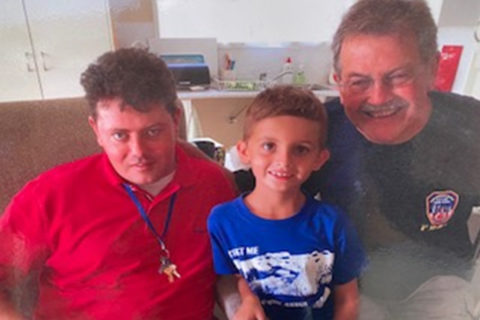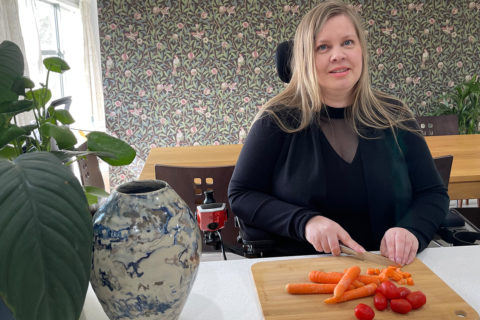Sarah* (43) is a single Mum who lives at Noosa on the Sunshine Coast. Sarah’s passion and dream in life was to be teacher, however halfway through 2011, while on her teaching placement, her life changed.
After a slipped disc, and four subsequent years of back pain, Sarah was diagnosed with Ankylosing Spondylitis – a fusing of the bones in her spine.
It was during her years at University, and a doctor’s visit for what she thought was depression that the diagnosis came about. After years of excruciating pain, sleepless nights and specialists telling her that there was nothing wrong, Sarah had finally had enough. It took one GP to look a little deeper to discover the true cause of her pain.
Her GP sent her for x-rays, which returned results for either Ankylosing Spondylitis or Juvenile Rheumatoid Arthritis – one of these was more familiar to her than the other.
“I said ‘I think Ankylosing Spondylitis is what my Dad has’. I called him afterwards and he said ‘oh you too?’ – he didn’t even know it was genetic,” Sarah explained
“In the meantime, I had been suffering silently thinking it wasn’t something worth talking about – every second person seems to have a sore back for some reason. If I had known that it was genetic, I wouldn’t have waited four years, I would have followed up earlier.”
Ankylosing Spondylitis is generally diagnosed in four stages, dependent on how advanced the progression is. People diagnosed in phase one experience pain, but are able to retain their mobility and sometimes even work. Unfortunately for Sarah, by the time she was diagnosed the bones in her lumbar spine had completely fused, meaning she has little to no movement side to side in her spine or hips.
Because of this, she relies on a wheelchair to get around – and when she does not have access to his, she fatigues quickly, with inflammation occurring across her body in other joints. This means that Sarah’s chances of a fall are increased – a risk that she cannot afford to take.
“If I have even a minor trauma to my spine, like a fall or a light car accident that wouldn’t affect somebody else, there’s a high chance that I would fracture my back because there’s no give in it, it’s just completely fused.” she explained
Youngcare provided Sarah with funding to purchase a vehicle fit to be modified by the NDIS, which will allow her to travel as a passenger, with her wheelchair in the car. This will free up Sarah to get out into the community, and reduce the risk of her falling, while also helping her to retain her independence.
“There’s been things I have to turn down because I know I can’t do it without my wheelchair. So I’m looking forward to being able to say yes again,” Sarah said
“The wheelchair as well gives me independence from my support walkers, because it’s a powered wheelchair I can use the power stick myself, it means I feel a bit more independent and choose where I want to go rather than relying on someone to push me.”
For Sarah, a fall would put her at significant risk of fracturing her spine which would potentially mean she would be face long-term rehabilitation. The funding for the car means that this chances of this happening are far lower, and she can stay healthier, in her own home, for longer.
“I am ever so grateful for the assistance from Youngcare because it means the difference between being housebound and being able to participate in my community,” she explained
“Independence means dignity, independence means free choice, free will and being able to accomplish daily tasks with limited support. Because of Youngcare I can maintain my independence and participate in social and community events, and also maintain my health as well, it allows me to get to my specialists when I need to see them.”
“I can’t sum up how thankful I am – thank you so much for everything Youngcare has done, I really appreciate it. It makes such a huge difference!” Sarah said.















